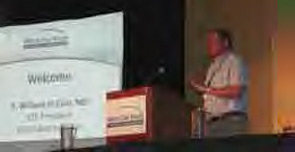More than 50 rheumatoid arthritis (RA) investigators from across the U.S. recently met in Ft. Worth, Texas, to share information, present data and results from their innovative RA research projects, and brainstorm ways to work more closely together to find a cure for the disease.
Each year, the ACR Research and Education Foundation (REF) holds an Investigators’ Meeting to bring RA researchers—all funded through its Within Our Reach: Finding a Cure for Rheumatoid Arthritis campaign—together with REF leadership, promising young investigators, and representatives from the National Institutes of Health to share progress on their individual research in RA and to find ways to assist each other. (See “An Eye on RA Innovations” in August’s issue, p. 1, for more on the meeting.)

“This meeting continues to present cutting-edge research on the cause, diagnosis, and treatment of RA,” says REF President E. William St.Clair, MD, a rheumatologist at Duke University Medical Center in Durham, N.C. “It provides RA researchers the opportunity to share information about their research while they are still in the early phases, which then facilitates idea sharing and collaboration—something that the REF is attempting to foster among the rheumatology research community.”
The REF’s current Within Our Reach investigators represent a variety of scientific disciplines, including biochemistry, cardiovascular disease, molecular biology, and genetics. The meeting created an environment in which leading scientists could exchange information and explore cross-disciplinary collaborations that might move the field forward.
William Robinson, MD, PhD, a Within Our Reach investigator and rheumatologist from Stanford University’s School of Medicine in Stanford, Calif., has attended two previous Investigators’ Meetings, which have led to new research collaborations focused on RA. He understands that this forum for information sharing is important to advancing RA research and providing better treatment for patients. “Scientific research requires significant resources—from the collection of sample sets to performing trials to developing highly specialized technology to having unique model systems,” he explains. “One investigator will have collected a unique sample set, while another will have a unique technology, while another will have developed a unique experimental system. Collaboration enables the investigators to address questions that none of the individual investigators could address on their own.”
Support Research Today
To make a pledge or one-time donation to the REF for the Within Our Reach campaign, visit www.rheumatology.org/REF. For more information about the Within Our Reach campaign, and to read about the grant projects, visit www.WithinOurReach.info.
This is something not often seen in the highly competitive medical research community. “This program is a unique opportunity to accelerate RA research,” explains Dr. St.Clair. “The Within Our Reach–funded investigators are open to collaboration and information sharing because they want to find a cure for this disease—they want to help patients. It is unique, and it works.” Recent treatment advances have made it possible to stop, or at least slow, the progression of joint damage, but serious complications and premature death remain risks of RA. More research is needed to uncover the cause and to find the cure for RA.
During this two-day meeting, more than 30 RA studies were presented for peer-to-peer education, input, and collaboration. Investigators shared their research in clinical practice, discussed the link between RA and cardiovascular disease, examined the basis for bone and tissue involvement, and provided evidence for genetic links to the disease. “Most of these studies are in the beginning phases, and these investigators are diligently working to move them forward,” says Dr. St.Clair. “The exchanging of ideas and forming of collaborations at this meeting will catapult the field forward, which is exciting news for both the medical community and the patients we treat.”